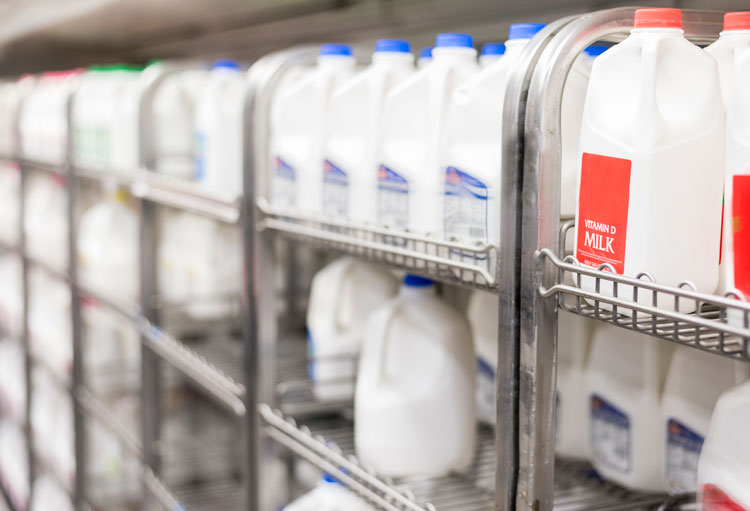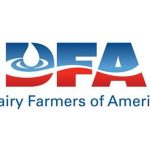
In the current climate, retail sales are accounting for more like 80% of dairy sales, he said.
Talbot and Dairy Farmers of Wisconsin CEO Chad Vincent joined the Hoard’s Dairyman DairyLivestream broadcast on April 22 to discuss how dairy checkoff-based organizations are working diligently to meet the needs of a restructured dairy system amidst the unprecedented collapse of food service.
DairyLivestream is a special series of web meetings featuring expert perspectives from some of our nation’s leading dairy professionals. In addition to Talbot and Vincent, on this week’s episode were University of Wisconsin-Madison Director of Dairy Policy Analysis Mark Stephenson and Cornell University dairy economist Andy Novakovic to discuss USDA’s steps in providing relief for dairy farmers.
A recording of the entire broadcast can be viewed here.
Dairy for families at home
Of course, grocery sales skyrocketed during the first few weeks of the pandemic as consumers stocked up. Vincent pointed out that grocery sales in Wisconsin were up 60% in that time window. Now, sales have slowed to a 25% to 30% increase . . . which is still exceptional.
“But this isn’t enough to overcome the food service losses,” said Vincent.
With more dairy products needing a home, both Vincent and Talbot explained how their organizations are talking with processors and food banks every day to act as matchmakers between the two. Creating those partnerships is not as easy as it may seem, Vincent mentioned. “It’s such a complex situation.”
Talbot agreed, adding that someone has to pay for the processing and packaging of these donated products.
But that work is continuing, along with getting dairy limits lifted in grocery stores such as Target and Pick ’n Save. Checkoff communications have shifted food service-targeted messages to more at-home recipes to encourage consumer use of dairy products.
For federal help in using dairy products, USDA announced Friday, April 17 that it will purchase $100 million in each of the next six months of dairy products such as yogurt, cheeses, and fluid milk to distribute in emergency food boxes at food banks around the country. USDA also pledged to purchase $100 million each of meats and produce, such as vegetables and fruits, over the same time frame.
Farmer payments
The Coronavirus Aid, Relief and Economic Security (CARES) Act earmarked $2.9 billion for direct payments to dairy farmers, with a limit of $125,000 received per commodity or $250,000 per entity. Stephenson estimated that these limits would result in a payment rate of about $1.60 per hundredweight (cwt.).
Many questions remain about the details of the program, including if those payment caps will include what a farmer may receive from the Dairy Margin Coverage (DMC) program. DairyLivestream will address the relief package in future programming once more information is made available.
Just-in-time system
We have learned all too well recently that our food supply is based on a “just-in-time” system because no one, from processors to grocers, wants to carry extra inventory. This works smoothly until there is a crisis. Talbot explained that substantial overhauls to this “just-in-time” idea would be extremely expensive.
The panelists recognized that we may see some shift in production after this pandemic has subsided, though. Processing organizations may make investments for more diversification to at least give themselves the option to sell both retail and food service products. “Processors are very good at what they do, but it’s hard to divert their product,” said Vincent.
An ongoing series of events
DairyLivestream will continue to dissect various aspects of the dairy markets over the coming weeks. Join us each Wednesday at 11 a.m. (CDT) to hear from dairy leaders and experts. Registering for one event will register you for every week.
“Tapping the brakes on milk flow” will be the discussion topic for the April 29 DairyLivestream.
Cornell University’s Jason Karszes and the University of Illinois’ Michael Hutjens will be special guests to join weekly DairyLivestream commentators Mark Stephenson, Chris Wolf, and Corey Geiger. Hutjens will delve into immediate nutrition adjustments, and Karszes will detail comprehensive farm management strategies. Stephenson will discuss regional matters along with considerations for co-ops, as Wolf digs into short- and long-term expense strategies.
As always, the panel will field over 30 minutes of audience questions during the hour-long program.

























